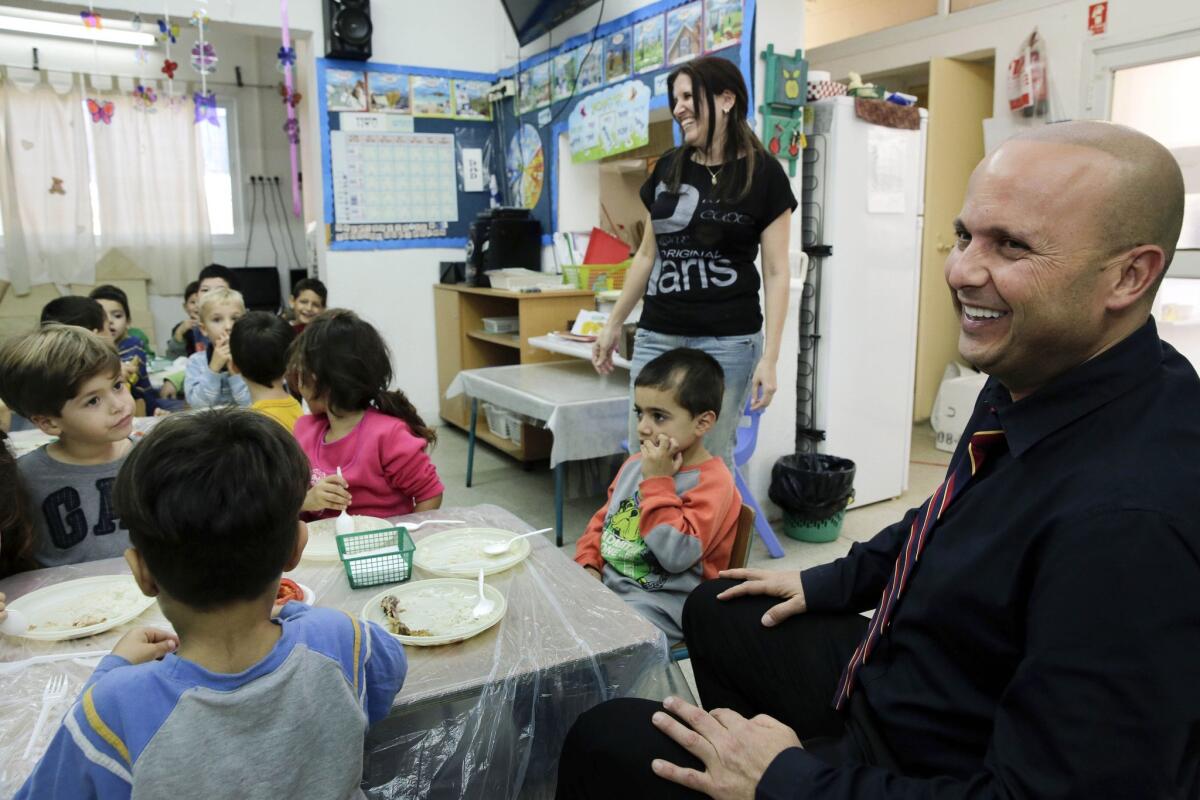Tension grows between Israel’s Jewish majority and Arab minority

Reporting from Jerusalem — Tensions gripping Israel after this week’s attack on a Jerusalem synagogue took on distinct ethnic overtones Thursday when a mayor in southern Israel said he was banning Arab workers from construction projects at local day-care centers.
The mayor of Ashkelon, Itamar Shimoni, swiftly came under criticism from other Israeli officials over the ban, which he said had come in response to demands by parents and was not intended as a permanent measure. The workers in question were building reinforced concrete safe rooms to protect the preschoolers and their teachers against rocket fire from the Gaza Strip.
Shimonoi also ordered armed guards placed near dozens of other construction sites employing Arabs.
Arab citizens of Israel, who make up 20% of the population, responded to the news with a mixture of resignation and indignation. “Why stop at kindergartens?” Arab Israeli lawmaker Ahmed Tibi asked sarcastically. “Maybe all of Israel should just be Arab-free?”
While recent clashes have involved mainly Palestinians living in the West Bank and East Jerusalem, where Arabs are in the majority, the friction has spilled over into Israeli cities and towns that have predominantly Arab populations.
Earlier this month, the fatal police shooting of a young Arab man who had battered a police vehicle triggered days of rioting around the northern town of Kfar Kana. Protests were galvanized by a video that appeared to show the man backing away as he was shot.
The Kfar Kana episode crystallized feelings of resentment on the part of many Israeli Arabs, who say they are often treated as second-class citizens, facing systematic discrimination in jobs, housing and education. Arab sensibilities also have been rankled by efforts by Prime Minister Benjamin Netanyahu’s government on behalf of a bill that would designate Israel as the “nation-state” of the Jews.
No Arab citizen of Israel has been implicated as a perpetrator in a recent wave of attacks that have killed 11 people in the past month, including five who died in Tuesday’s assault on a synagogue in the devoutly religious neighborhood of Har Nof in West Jerusalem.
But even before the synagogue carnage, a series of “lone-wolf” assaults by assailants wielding knives or using cars as weapons had left many Israeli Jews feeling fearful for their personal safety. In some quarters that has led to blanket mistrust of all Arabs, whether they are citizens of Israel or not.
Authorities were investigating whether the two assailants in Har Nof, who were killed by police at the scene, had worked in a store in the neighborhood, and thus had knowledge of prayer times, and the fact that the synagogue was virtually unguarded. The attackers were Arab residents of East Jerusalem, most of whom do not have Israeli citizenship but are able to move and work freely in the city.
In response to the Har Nof assault, Israeli police on Thursday handed notices to the families of the two attackers and two other Palestinians involved in earlier incidents ordering their homes demolished.
Arab citizens of Israel fill many professional positions across the country, but also dominate the labor pool doing more menial tasks. They are routinely found in such jobs as construction work, car repair, delivery and stocking store shelves — putting them in close proximity with Israeli Jews.
Several Israeli government ministries, including those of justice, interior and the economy, said they were looking into the legality of the move in Ashkelon, suggesting it violated equal-opportunity rules.
“During these difficult times, I expect employers to exercise responsibility and leadership to encourage tolerance and equal opportunities and not exclusion,” said Tziona Koenig-Yair, the commissioner for equal employment opportunities at the Ministry of the Economy. She added pointedly that she was referring to “particularly local authorities such as the Ashkelon municipality.”
Similar tensions arose during the summer conflict in the Gaza Strip, when Arab Israelis reported being harassed on social media or even losing their jobs if they expressed sympathy for the suffering of Palestinians in the coastal enclave. More than 2,100 Palestinians were killed in 50 days of fighting, and the United Nations says the majority were civilians.
The ban in Ashkelon came under criticism even from right-wing figures such as Cabinet minister Naftali Bennett, who said that while Israel would wield “a heavy hand against terrorists,” it must also embrace its “loyal citizens.”
Netanyahu, responding to the Ashkelon controversy, declared Thursday that “there is no place for discrimination against Israeli Arabs.” However, the prime minister has threatened to revoke the citizenship of Israeli Arabs who take part in anti-Israel activity.
In the wake of the synagogue attack, authorities have been on the alert for vigilante-style attacks in retaliation. Hours after the killings in Har Nof, bands of Jewish youths marched on a main roadway in Jerusalem, shouting “Death to Arabs!”
Some observers said the Ashkelon incident pointed not only to current unrest, but the threat to long-term hopes for peaceful coexistence.
“Are we giving the two populations — Jews and Arabs in Israel, and Israelis and Palestinians in general — hopes for a better future?” asked Ron Huldai, the mayor of Tel Aviv. “So long as we engage in these quarrels … there will be more waves of violence.”
Shimoni, posting on Facebook as the criticism mounted, was unapologetic. “Difficult decisions come at a price,” he wrote. “My constituents come first.”
Sobelman is a special correspondent.
Follow @laurakingLAT on Twitter for news out of the Middle East
More to Read
Sign up for Essential California
The most important California stories and recommendations in your inbox every morning.
You may occasionally receive promotional content from the Los Angeles Times.










